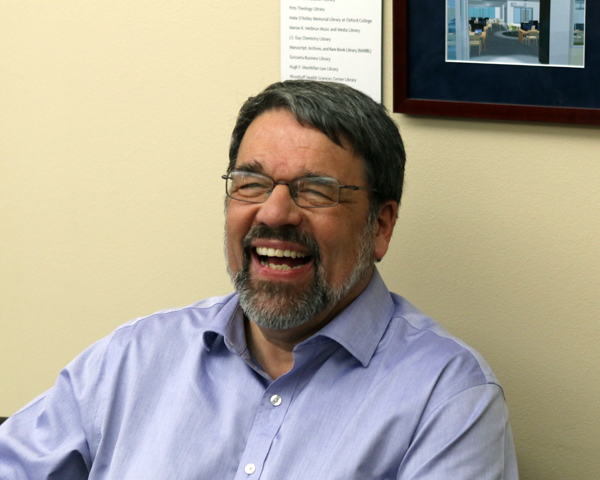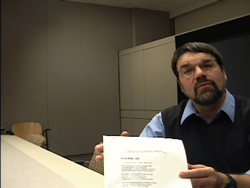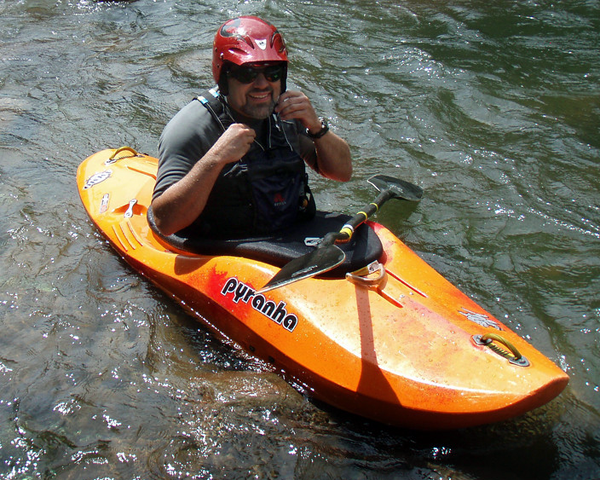
Chuck Spornick is retiring after being at Emory for 31 years. Lars Myers and I sat down with him recently and asked him to reflect about his career.
Question: Tell us about your time at before coming to Emory.
Chuck: I was trained as a medievalist at Notre Dame, and I received my PhD in history there. Notre Dame was also my first experience with libraries as I worked for four years as a student assistant in the medieval studies library. I took my first professional librarian job at the University of Iowa where I worked as a cataloguer and a medieval studies librarian for two years before coming to Emory.
Question: Where are you from originally?
Chuck: I’m from the southside of Chicago. I was born in East Chicago, IN, and went to school in Hammond IN, just across the state line from the city.
Question: What brought you to Atlanta?
Chuck: While at Iowa, I was looking at the Chronicle of Higher Education for a job in collections, and I was at my home with my wife Cathi and our newborn baby. It was 37 degrees below zero, with a windchill of 80 below. I saw a collections job at Emory, and said, “Atlanta. That’s gotta be warmer.” So that’s what brought me here in 1986.
Question: Who was the head librarian then?
Chuck: Ted Johnson was the head librarian at that time.
Question: When you think back about your time in the Library, what are some of the highlights of your 31 years?
Chuck: In thinking about the last 31 years, I think about the people that I’ve worked with. It really is the people that stand out. I’ve had a chance to work with a lot of good, bright people who have been friends and colleagues over the years. I started as a cataloguer and a humanities librarian in the early days when Emory was truly trying to build its collection. Emory had just received the Woodruff donation of $105,000,000 dollars. It was until that date the largest single donation ever to an institution of higher learning. It was a donation that transformed Emory, providing resources for the development and expansion of a host of research programs. These programs required research collections. From 1986 to 1991 we developed a justication for the collection growth and in those five years the collection budget tripled.
Question: What was your big selling point for growing the collections?
Chuck: Our university administrators were comparing our holdings to our peer group and understood that a gap existed between us and school like Vanderbilt and Duke. This is when Emory began to plan for the systematic development of research collections.

Question: Tell us more about the positions you have held at Emory.
Chuck: Emory is a place where you can grow and develop. I’ve had four radically different jobs here. After starting as the Humanities Coordinator for collections (as well as a cataloger) I visited the University of Virginia’s brand, spanking new electronic text center in 1994 and we decided to create the same thing at Emory. So, I became the first permanent director of the center at Emory, called the Louis H. Beck Center for Electronic Collections. We purchased full texts but also had a number of projects with faculty to create full electronic texts. We worked closely with Steve White, Sheila Cavanagh, Harry Rusche and Ron Schuchard in building digital collections.
Question: What other things come to mind for you?
Chuck: I remember working with Ken Guyton and Bela Gazdy. They spent long hours helping me bring up our first IBM server in the Woodruff Library and then that led to the endless work of getting it configured properly. We started with the Oxford English Dictionary and went on from there. It was a chance to work behind the scenes where the magic really happens. It was a lot of parsing error ports. We had a great partnership with developers like Julia Leon and we worked well with Wayne Morse. The union between the library and computing side of the house has been interesting. There has been an ongoing partnership for years.
Question: A lot of that work came from grant funding from NEH?
Chuck: We had annual grants every year from the Beck Foundation and a large grant from the NEH that helped pay for programming, equipment, and an army of grad students who did the work. I was the co-lead with Sheila Cavanagh as the principal investigators.
Question: You had a number of grad students go through the Beck Center into careers in libraries?
Chuck: A lot of them went into libraries and others went into teaching. I think the project experience helped them find a position in the academy.
Question: It was the beginning of hiring students not just to shelve books but to get involved in focused projects, right?
Chuck: Yes, you are right, in fact the students would develop a training program for new recruits to the text center.

Question: What is retirement going to be like for you?
Chuck: I am looking forward to it. I enjoy cycling and kayaking . I worked with Bob Greene and Alan Cattier on a book about the Bartram Trail back in 2003. I am going to do a similar project on trails in the Cinque Terre in Italy. It’s a beautiful part of the country south of Genoa. It is very California-like with the mountains falling into the sea. Cathi lived there in college, and I fell in love with the place during visits over the years.
Question: What’s your lasting impression of working at Emory?
Chuck: I’ve always been impressed by how much people really do care about the success of faculty and students. I know of other institutions where that is not necessarily the case. People really do care.
Leave a Reply